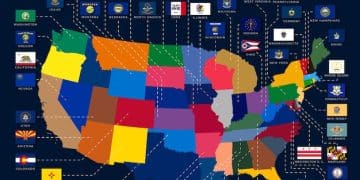Government Programs for Seniors: Housing, Healthcare & Financial Aid

Government programs for seniors in the U.S. offer vital support, addressing housing, healthcare, and financial challenges through various federal and state initiatives designed to enhance their quality of life.
Navigating the golden years often comes with financial and health challenges. Fortunately, numerous government programs for seniors: housing, healthcare, and financial assistance options are available to provide support and ensure a comfortable and dignified life.
Understanding Government Programs for Seniors
Government programs play a crucial role in supporting seniors, offering a safety net for those with limited resources. These programs are designed to address various needs, from housing and healthcare to financial assistance and other essential services.
Understanding the landscape of these programs is the first step toward accessing the benefits you or your loved ones may be entitled to. Let’s explore the types of assistance available and how they can make a significant difference in the lives of seniors.
Types of Government Assistance
Government assistance for seniors encompasses a broad range of programs that cater to specific needs. These programs can be broadly categorized into housing, healthcare, and financial assistance.
Each category offers distinct benefits and eligibility criteria. By understanding these distinctions, seniors and their families can navigate the system more effectively and access the most appropriate resources.
- Housing Assistance: Provides support for affordable housing options, rent subsidies, and home repair grants.
- Healthcare Assistance: Offers comprehensive medical coverage through programs like Medicare and Medicaid, as well as specialized services for seniors.
- Financial Assistance: Includes programs like Social Security, Supplemental Security Income (SSI), and tax credits to help seniors manage their finances.
Many of these programs are administered at the federal level, while others are managed by state or local governments. This means that eligibility requirements and benefit amounts can vary depending on where you live.

Housing Assistance Programs for Seniors
Securing affordable and safe housing is a major concern for many seniors. Fortunately, several government programs are available to help with housing costs and ensure seniors have a comfortable place to call home.
These programs range from rent subsidies to assistance with home repairs, providing a variety of options for seniors with different housing needs.
Section 8 Housing Choice Voucher Program
The Section 8 Housing Choice Voucher Program, administered by the Department of Housing and Urban Development (HUD), is one of the most widely used housing assistance programs. It provides rental assistance to eligible low-income families, including seniors.
Participants receive a voucher that covers a portion of their rent, allowing them to live in privately owned rental housing. The amount of the voucher is based on the participant’s income and the fair market rent for the area.
Public Housing
Public housing is another option for seniors seeking affordable housing. These are government-owned properties managed by local housing authorities.
Public housing is available to low-income individuals and families, including seniors, who meet certain eligibility requirements. Rental rates are typically based on a percentage of the tenant’s income.
- Home Investment Partnerships Program (HOME): Provides funding to states and local communities to create affordable housing for low-income households, including seniors.
- Rural Housing Service (RHS): Offers loans and grants to seniors in rural areas for home repairs, rehabilitation, and new construction.
- State and Local Programs: Many states and local governments offer additional housing assistance programs specifically for seniors, such as property tax relief and home repair grants.
Eligibility criteria for housing assistance programs vary but generally include income limits, age requirements, and residency requirements. Seniors interested in applying for these programs should contact their local housing authority or social services agency for more information.
Healthcare Assistance for Seniors
Healthcare is a top priority for seniors, and access to affordable medical care is essential for maintaining their health and well-being. Government programs play a critical role in providing healthcare assistance to seniors.
Medicare and Medicaid are the two primary federal programs that offer healthcare coverage to eligible seniors. Understanding the differences between these programs and how they can benefit seniors is crucial.
Medicare
Medicare is a federal health insurance program for people aged 65 and older, as well as some younger people with disabilities. It is divided into several parts, each covering different types of healthcare services.
Medicare Part A covers hospital care, skilled nursing facility care, hospice care, and some home healthcare services. Medicare Part B covers doctor’s visits, outpatient care, preventive services, and some medical equipment.
Medicaid
Medicaid is a joint federal and state program that provides healthcare coverage to low-income individuals and families, including seniors. Eligibility requirements vary by state.
Medicaid covers a wide range of healthcare services, including doctor’s visits, hospital care, prescription drugs, and long-term care. In many states, Medicaid also covers services not covered by Medicare, such as dental and vision care.
- Prescription Drug Assistance Programs: Offers help with prescription drug costs through Medicare Part D and state-sponsored programs.
- Long-Term Care Services: Provides coverage for nursing home care, home healthcare, and other long-term care services for eligible seniors.
- Veterans Affairs (VA) Healthcare: Offers comprehensive healthcare services to eligible veterans, including seniors.
Seniors may be eligible for both Medicare and Medicaid, which is known as dual eligibility. In these cases, Medicaid may cover some of the costs not covered by Medicare, such as deductibles and co-pays.

Financial Assistance Programs for Seniors
Many seniors face financial challenges due to fixed incomes and rising living costs. Government programs offer financial assistance to help seniors meet their basic needs and maintain a decent standard of living.
Social Security, Supplemental Security Income (SSI), and various tax credits are among the key financial assistance programs available to eligible seniors.
Social Security
Social Security is a federal program that provides retirement, disability, and survivor benefits to eligible workers and their families. Most seniors receive Social Security retirement benefits, which are based on their lifetime earnings.
The full retirement age for Social Security is gradually increasing, but most seniors can begin receiving reduced benefits at age 62. The amount of the benefit depends on the individual’s earnings history and the age at which they begin receiving benefits.
Supplemental Security Income (SSI)
SSI is a federal program that provides cash assistance to low-income seniors and people with disabilities who have limited resources. SSI is designed to supplement Social Security benefits for those with very low incomes.
Eligibility for SSI is based on income and asset limits, which vary by state. SSI recipients may also be eligible for Medicaid and other social services.
- Tax Credits for Seniors: Offers tax credits and deductions for eligible seniors, such as the Credit for the Elderly or the Disabled.
- Low Income Home Energy Assistance Program (LIHEAP): Provides assistance with home heating and cooling costs for low-income households, including seniors.
- Supplemental Nutrition Assistance Program (SNAP): Offers food assistance to low-income individuals and families, including seniors, through electronic benefit transfer (EBT) cards.
Seniors can apply for these financial assistance programs through the Social Security Administration, the Internal Revenue Service (IRS), or their local social services agency.
Other Government Resources for Seniors
In addition to housing, healthcare, and financial assistance programs, the government offers a variety of other resources and services to support seniors. These resources can help seniors stay active, engaged, and independent.
Senior centers, transportation services, and legal assistance are just a few examples of the many resources available to seniors through government and community-based organizations.
Senior Centers
Senior centers are community-based facilities that offer a wide range of programs and services for seniors. These centers provide opportunities for socialization, recreation, education, and health promotion.
Senior centers often offer activities such as exercise classes, arts and crafts workshops, educational seminars, and social events. They may also provide services such as congregate meals, transportation, and information and referral.
Transportation Services
Transportation can be a major challenge for seniors, especially those who no longer drive. Government and community-based organizations offer a variety of transportation services to help seniors get to medical appointments, grocery stores, and other important destinations.
These services may include public transportation options, volunteer driver programs, and specialized transportation for seniors with disabilities.
- Legal Assistance: Provides free or low-cost legal services to seniors on a range of issues, such as estate planning, elder abuse, and consumer protection.
- Nutrition Programs: Offers meals and nutrition education to seniors through programs such as Meals on Wheels and congregate meal sites.
- Volunteer Opportunities: Encourages seniors to stay active and engaged by volunteering in their communities through programs such as the Senior Corps.
Seniors can find information about these resources and services through their local Area Agency on Aging (AAA), senior center, or social services agency.
Navigating the Application Process
Applying for government programs can sometimes be a complex and confusing process. However, with careful planning and preparation, seniors can successfully navigate the application process and access the benefits they need.
Understanding eligibility criteria, gathering necessary documents, and seeking assistance from trusted resources are all essential steps in the application process.
Understanding Eligibility Criteria
Each government program has its own specific eligibility criteria, which may include age requirements, income limits, residency requirements, and other factors. Before applying for a program, it’s important to carefully review the eligibility criteria to ensure that you meet the requirements.
You can find information about eligibility criteria on the program’s website or by contacting the administering agency.
Gathering Necessary Documents
When applying for government programs, you will typically need to provide documentation to verify your eligibility. This may include proof of age, income, residency, and other relevant information.
Common documents required for government program applications include a birth certificate, Social Security card, tax returns, bank statements, and utility bills.
- Seeking Assistance: Do not hesitate to seek assistance from trusted resources, such as senior centers, social services agencies, or legal aid organizations.
- Keeping Records: Keep copies of all application materials and correspondence with the administering agency.
- Following Up: After submitting your application, follow up with the agency to check on its status and ensure that it is being processed in a timely manner.
Navigating the application process may take time and effort, but the benefits of accessing government programs can be well worth the investment. With persistence and the help of trusted resources, seniors can secure the support they need to live comfortable and dignified lives.
| Key Point | Brief Description |
|---|---|
| 🏠 Housing Assistance | Programs like Section 8 and public housing offer affordable housing options for seniors. |
| 🩺 Healthcare Coverage | Medicare and Medicaid provide essential healthcare coverage, including doctor visits and hospital care. |
| 💰 Financial Aid | Social Security and SSI offer financial support to help seniors meet basic needs. |
| 🧑⚖️ Legal Assistance | Free or low-cost legal services are available for seniors facing issues like estate planning or elder abuse. |
Frequently Asked Questions About Government Programs for Seniors
▼
Seniors can access housing assistance through programs like Section 8 Housing Choice Vouchers, public housing, and state-sponsored initiatives that provide rental subsidies and support for home repairs.
▼
Medicare covers a variety of healthcare services, including hospital care (Part A), doctor visits (Part B), and prescription drugs (Part D), ensuring seniors have access to necessary medical care.
▼
Social Security provides retirement benefits based on lifetime earnings, offering a steady income stream to eligible seniors to help cover living expenses and maintain financial stability.
▼
SSI is a federal program that provides cash assistance to low-income seniors and people with disabilities who have limited resources, helping them meet their basic needs.
▼
Seniors can gather information about government programs from local Area Agencies on Aging (AAA), senior centers, social services agencies, and government websites that offer comprehensive details.
Conclusion
In conclusion, government programs for seniors: housing, healthcare, and financial assistance options offer vital support to enhance their quality of life. By understanding and accessing these resources, seniors can navigate their golden years with greater security and dignity.





